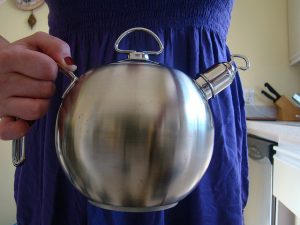Brew Up Anxiety Relief: Five Relaxing Teas
 Even those of us who prefer coffee over tea can appreciate the calming effect of certain herbal teas. They are an enjoyable, generally safe, anxiety management tool.
Even those of us who prefer coffee over tea can appreciate the calming effect of certain herbal teas. They are an enjoyable, generally safe, anxiety management tool.
An afternoon or evening cup can ease physical tension and soothe psychological stress. Some herbal teas promote deep, restful sleep. By sampling different calming tea-types, you are likely to find one that is both a relaxation aid and a simple pleasure.
Five Calming Herbal Teas
American Passionflower (Passiflora incarnata). A tranquil evening ritual might be listening to gentle music while enjoying a cup of passionflower tea. Passionflower, considered a mild sedative, helps relieve nervous tension and anxiety. Women who are pregnant should talk to their doctor before ingesting passionflower.
Valerian (Valerian officinalis). Valerian is often used to treat insomnia because it soothes our entire nervous system and is sedating. Until you know how your body responds to this tea, steep it with moderation, and drink it slowly. If made extremely strong or taken in excess valerian can cause headaches or lethargy.
Lemon-Balm (Melissa officinalis). This light refreshing tea calms the central nervous system while cheering our heart. Sipping a cup in the evening helps quiet the mind, and may soothe a headache away should you have one. It also promotes a good night’s rest. Steep for up to 15 minutes if you like a strong lemon flavor. Lemon-balm is delicious when served hot or cold.
Catnip (Nepeta cataria). This woodsy tasting tea might be the perfect pleasure during an afternoon work break since it will leave you relaxed and alert—a good antidote for restlessness.
Linden (Tilia x europea). If a lightly sweet, floral scented tea sounds appealing, brew up a cup of linden. In areas of Europe, this herb is a traditional remedy for nervousness, indigestion, insomnia, anxiety, headaches, high blood pressure and heart palpitations. Steep linden tea for no more than three to four minutes.
Making Excellent Herbal Tea
For each cup of water, add one teaspoon of dried herb, or 3 tbsp. fresh crushed herb. Pour boiling water over the leaves/flowers and steep for five to ten minutes—five minutes is usually enough. Store dried herbs away from light in airtight containers.
If you are on prescription medications, consult with your doctor before using herbs.
Source: Tea Mag
Photo Bucket: vmiramontes (@flickr)
 Eating Disorder Self Test. Take the EAT-26 self test to see if you might have eating disorder symptoms that might require professional evaluation. All answers are confidential.
Eating Disorder Self Test. Take the EAT-26 self test to see if you might have eating disorder symptoms that might require professional evaluation. All answers are confidential.